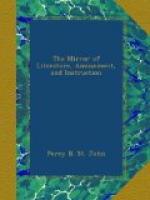Accordingly, our churches are now closed in the week-days, for we are too busy to repair to them; our politicians crying out, with Pharaoh, “Ye are idle, ye are idle; therefore would ye go and do sacrifice to the Lord.” Our cathedrals, it is true, are still open; but where are the worshippers? Instead of entering in, the citizen avails himself of the excellent clock which is usually attached to them, sets his watch, and hastens upon ’Change, where the congregation is numerous and punctual, and where the theological speculations are apt to run in Shylock’s vein pretty exclusively. If a church will answer, then, indeed, a joint-stock company springs up; and a church is raised with as much alacrity, and upon the same principles, as a play-house. The day when the people brought their gifts is gone by. The “solid temples,” that heretofore were built as if not to be dissolved till doomsday, have been succeeded by thin emaciated structures, bloated out by coats of flatulent plaster, and supported upon cast-metal pegs, which the courtesy of the times calls pillars of the church. The painted windows, that admitted a dim religious light, have given place to the cheap house-pane and dapper green curtain. The front, with its florid reliefs and capacious crater, has dwindled into a miserable basin.
* * * * *
AN ARTIST’S FAME.
Painter. Let none call happy one whose art’s deep source They know not—or what thorny paths he trode To reach its dazzling goal! Marquis. What dost thou mean? Painter. I’ll seek a simile—Some gorgeous cloud Oft towers in wondrous majesty before ye— It bathes its bosom in pure ether’s flood, Evening twines crowns of roses for its head, And for its mantle weaves a fringe of gold; Ye gaze on it admiring and enchanted— Yet know not whence its airy structure rose! If it breathe incense from some holy altar, Or earth-born vapours from the teeming soil, When rain from Heav’n descends—if fiery breath Of battle, or




